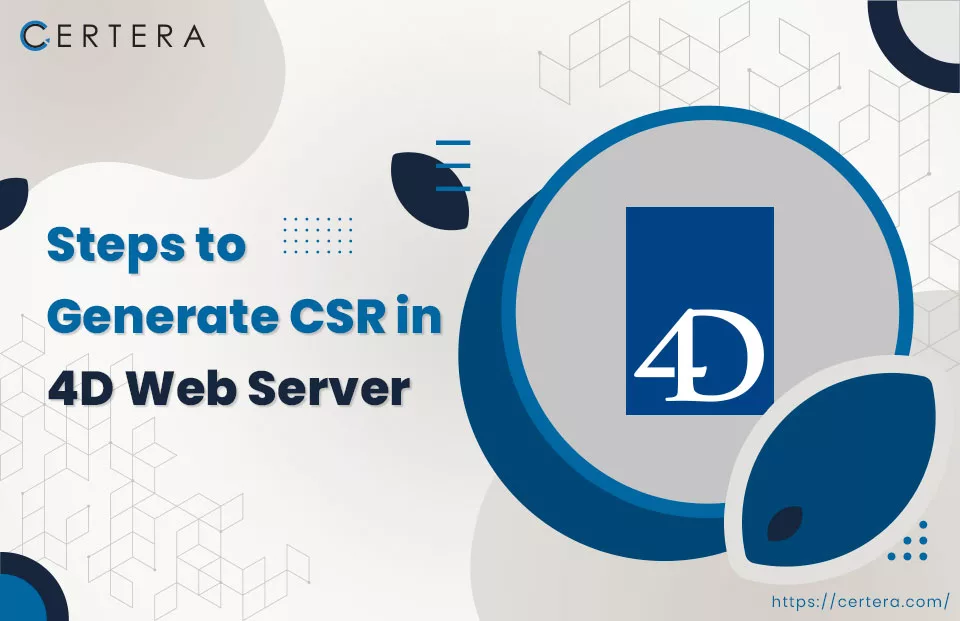How to Generate CSR in 4D Webstar Server?

Generating a CSR and private key on your 4D Webstar server allows you to obtain an SSL certificate from a trusted Certificate Authority. SSL certificates enable HTTPS communication to your server, providing several essential benefits. HTTPS secures the data transmitted between clients and your server. It helps protect against potential eavesdropping or man-in-the-middle attacks.
The CA ensures that the SSL certificate is only issued by validating your domain control through the CSR. This keeps your private key secure on your server, while the CA only sees the information in the CSR.
Having a valid SSL certificate improves trust and security for your website visitors. Browsers will show a padlock lock for HTTPS sites, indicating the page is secure.
Steps to Generate a CSR and Private key on a 4D Webstar Server
- Open the 4D Webstar Admin interface and Login with Correct Credentials.
- Go to the SSL Certificates section.
- Click the “Generate Private Key and CSR” button.
- Select the key size. Usually, 2048 or 4096 bits is recommended.
- Enter an organization name and unit (dept, division, etc). It will identify your organization.
- Enter the domain name that will use the certificate. It will match the domain the certificate will be used for.
- Enter information for a contact person who can be reached regarding the certificate.
- Select the hash algorithm. SHA-256 or SHA-384 are usually good choices.
- Click the “Generate” button. It will generate a private key and a Certificate Signing Request (CSR) file.
- Download the CSR file.
- You must submit this to a Certificate Authority (CA) for a signed SSL certificate.
- Once you receive the signed certificate back from the CA, upload it in the 4D Webstar Admin interface under the SSL Certificates section.
- Then activate the certificate to make it start securing communication to your 4D Webstar server.
How to Generate Your CSR Using OpenSSL?
Securing your online presence with an SSL certificate is fundamental to modern digital communication. If you’re ready to embark on this journey, follow these straightforward steps to generate your Certificate Signing Request (CSR) using OpenSSL:
Access the Terminal:
Open the Terminal on your system, serving as your gateway to executing OpenSSL commands.
Select a Directory:
Navigate to a directory where you intend to store your SSL certificate documents. For instance, you could create a dedicated folder named “SSL certificate” on your Desktop and navigate to this location.
Generate the CSR:
Run the following command in the Terminal:
openssl req -new -newkey rsa:2048 -nodes -keyout yourdomain.key -out your domain.csrDuring this process, you’ll be prompted to provide your contact details. Here’s how to fill in the required information:
- Country Name (2-letter code): Enter your country’s official two-letter code (e.g., US for the United States).
- State or Province Name: Input the full name of your company’s registered state or province (e.g., Tennessee).
- Locality Name: Provide the complete name of your company’s location city (e.g., Nashville).
- Organization Name: Enter the full legal name of your organization (e.g., Your Company LLC).
- Organizational Unit Name: Specify the department responsible for the SSL Certificate (e.g., IT).
- Common Name: This is crucial – input the Fully Qualified Domain Name (FQDN) you seek to secure (e.g., yourdomain.com).
Key Elements Generated:
As you execute the OpenSSL command, it generates both your CSR and private key files. Remember that the private key file is essential for decrypting your SSL certificate.
Saving Your CSR Contents:
Open the CSR file using a text editor and copy its contents. You must paste these contents into the corresponding field during the SSL certificate order process.
Next Step: How to Install SSL Certificate on 4D Server? [Next Step]